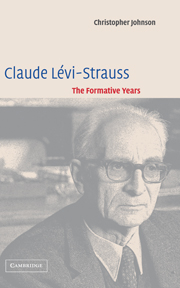Book contents
1 - The place of anthropology
Published online by Cambridge University Press: 05 June 2012
Summary
On entrevoit ainsi le bizarre carrefour de disciplines où se trouve aujourd'hui placée l'anthropologie.
(We perceive the singular crossroads of disciplines at which anthropology stands.)The publication of Anthropologie structurale in 1958 can be viewed as a defining moment in the history of French anthropology. The title of the work is itself a provocative statement of intention. The epithet ‘structurale’ signals the resolutely theoretical approach Lévi-Strauss was proposing for his discipline, but no less bold perhaps is the very designation of this discipline as anthropologie. The more common term in France was ethnologie, and his preference for anthropologie therefore marks a conscious decision to widen the normal definition of the discipline. The distinction he makes in the book between three moments or stages of anthropological enquiry is clear enough: ethnography, the empirical instance of observation in the field, is followed by ethnology, the preliminary synthesis of data provided by ethnography, both of which are subsumed in the global perspective on humankind offered by anthropology (SA 1, 355; AS 1, 388). By itself this proposed extension of the scope of French ethnology, by analogy with its British and American counterparts, seems a relatively innocent gesture, but it is far from so if one considers the interdisciplinary context in which it takes place. Not only do Lévi-Strauss's definitions of anthropology, of its object, methods and scope, serve to ensure the internal consistency of the discipline; equally and inseparably they help to determine the place of anthropology in relation to a number of neighbouring disciplines, and inevitably this place is a problematic one.
- Type
- Chapter
- Information
- Claude Lévi-StraussThe Formative Years, pp. 12 - 30Publisher: Cambridge University PressPrint publication year: 2003



